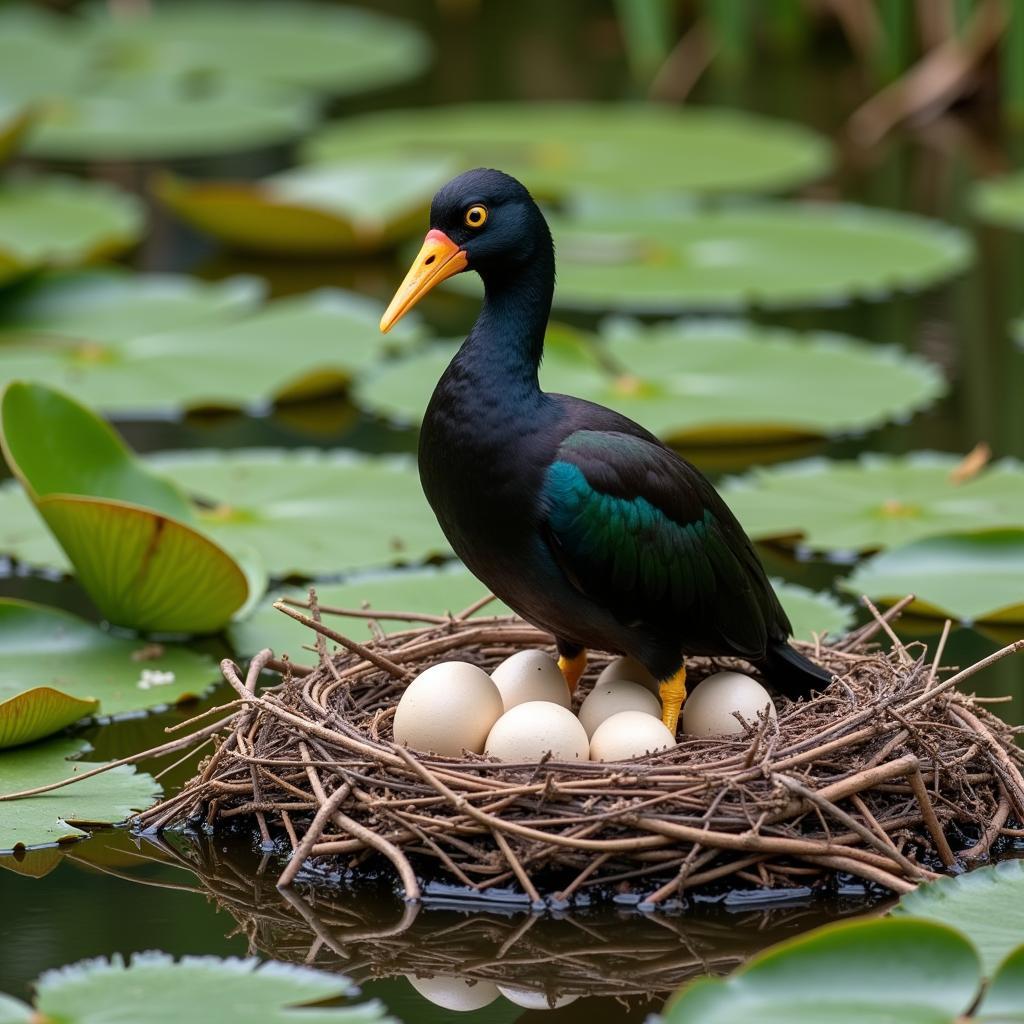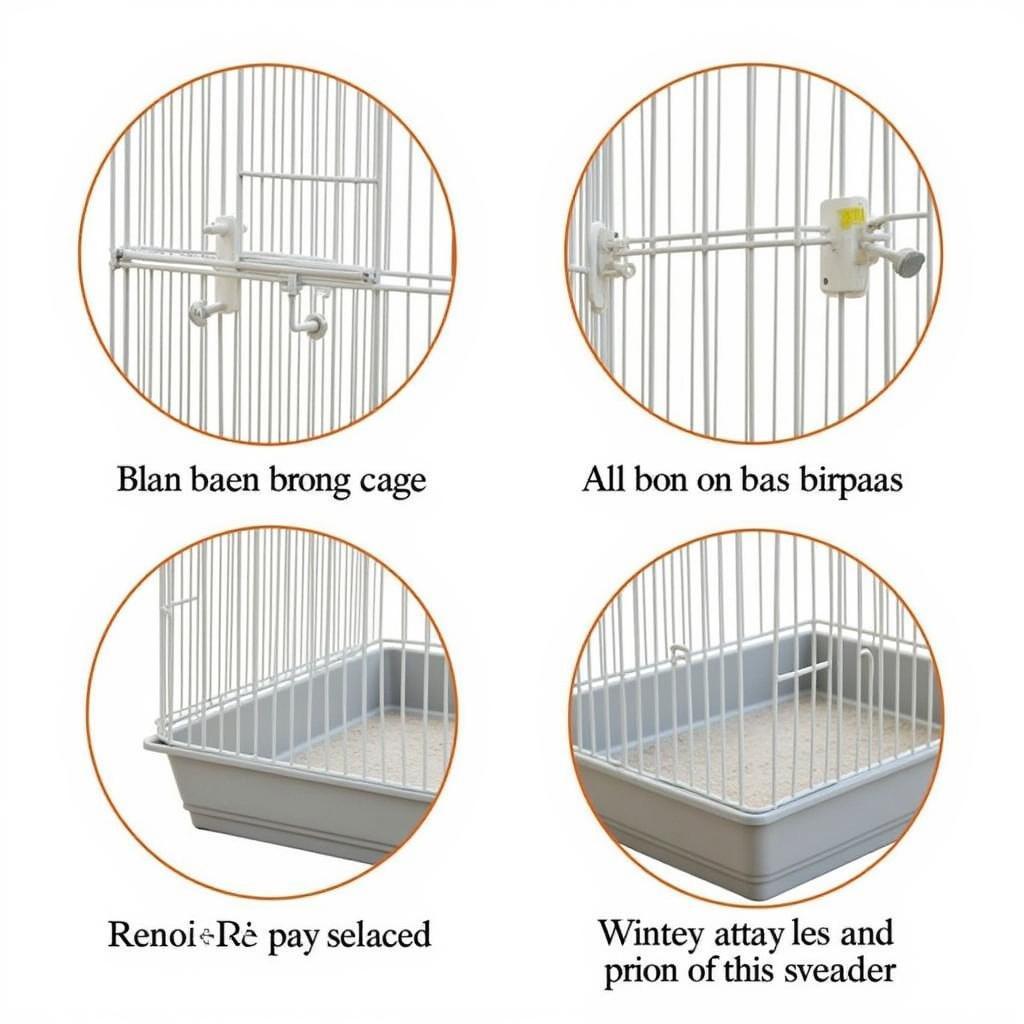The Intriguing World of the African Jacana Nest
The African Jacana Nest, a marvel of avian architecture, is a floating platform of vegetation, showcasing the ingenuity of these unique birds. This article delves into the fascinating world of the African jacana, exploring their nesting habits, parental roles, and the challenges they face in their watery habitats.
Building a Floating Fortress: The African Jacana Nest Construction
African jacanas, also known as lily trotters, are famous for their remarkable nests. Unlike most birds that build nests in trees or on the ground, jacanas construct their nests directly on floating vegetation. This seemingly precarious choice is a clever adaptation to their wetland environment. The nests, built by the male jacana, are made from readily available aquatic plants, forming a shallow, almost raft-like structure. This design allows the nest to rise and fall with the water level, protecting the eggs from flooding. The choice of materials and the loose construction also provide excellent camouflage, blending seamlessly with the surrounding lily pads and other aquatic plants.
Why Choose Water? The Advantages of an Aquatic Nest
The choice of an aquatic nest offers several advantages for African jacanas. Firstly, it provides protection from terrestrial predators. The water acts as a natural barrier, deterring many land-based animals. african jacana nest pictures Secondly, the abundance of insects and other invertebrates in the water provides a readily available food source for both the parents and the chicks. Finally, the floating nest is less susceptible to temperature fluctuations than nests built on land, offering a more stable environment for the developing eggs. What is the typical size of an African jacana nest? They are usually around 15-20 centimeters in diameter.
Role Reversal: The Unique Parenting of African Jacanas
African jacanas exhibit a unique reversal of traditional gender roles. The females are polyandrous, meaning they mate with multiple males and defend a territory encompassing the nests of several males. The males are solely responsible for incubating the eggs and caring for the young. This unusual arrangement allows the female to focus on defending her territory and laying more eggs, increasing her reproductive success. The male, dedicated to his paternal duties, becomes a vigilant protector and nurturer of his offspring. african jacana nests, though seemingly fragile, play a crucial role in this unusual family dynamic.
 Male African jacana incubating eggs.
Male African jacana incubating eggs.
Threats and Challenges to African Jacana Nests
Despite their clever adaptations, African jacana nests and their inhabitants face numerous challenges. Fluctuations in water levels, particularly during heavy rains or droughts, can threaten the nests. Predation by water snakes, monitor lizards, and birds of prey also poses a constant threat. Human activities, such as habitat destruction and pollution, further contribute to the challenges these fascinating birds face. Dr. Anika Olumide, a renowned ornithologist specializing in African birdlife, observes, “The delicate balance of the African jacana’s wetland ecosystem is crucial for their survival. Protecting these habitats is essential for the future of these remarkable birds.”
Conclusion
The African jacana nest, a simple yet ingenious construction, provides a window into the fascinating world of these unique birds. Their specialized adaptations, including their floating nests and reversed gender roles, demonstrate the remarkable diversity of life in African wetlands. Understanding and protecting these fragile ecosystems is crucial for ensuring the survival of the African jacana and the many other species that call these wetlands home. The african jacana birds and nest represent a fascinating example of adaptation and survival in the face of environmental challenges.
FAQ
- What does an African jacana nest look like?
- How many eggs does an African jacana lay?
- What are the main predators of African jacana nests?
- How long does it take for African jacana eggs to hatch?
- What is the lifespan of an African jacana?
- Are African jacanas endangered?
- How can I help protect African jacana habitats?
Other potential questions or relevant articles related to African wildlife.
- What other birds share the African jacana’s habitat?
- Learn more about the amazing wildlife of Africa’s wetlands.
- Explore the threats facing African wildlife and conservation efforts.
When you need assistance please contact Phone Number: +255768904061, Email: [email protected] Or visit us at: Mbarali DC Mawindi, Kangaga, Tanzania. We have a 24/7 customer service team.



